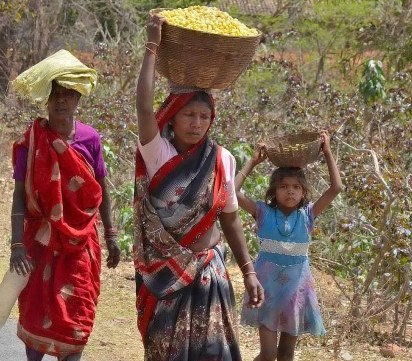Junagarh: Tribals residing under this block of Kalahandi district have resorted to distress sale of Mahua flowers due to lack of proper markets and smuggling of the forest produce, a report said.
Over 10,000 people residing in remote and tribal dominated Dundelmal, Dedar, Charbhati, Budidar, and Bankapalash panchayats are dependent on this minor forest produce for their livelihood as mahua flowers are available in plenty in the forest regions near their villages.
Reports said in the absence of other livelihood opportunities, collection of mahua flowers is the mainstay of tribals. They consider it to be a lucrative occupation as they earn their bread and butter, and clothes needed to maintain their families.
However, the state government has no plan for marketing of this minor forest produce which is available in this part of the state. As a result, the gullible tribals are forced to sale their produce at Rs 10-12 per kg.
Tribal families leave for jungle at 4 am to collect mahua flowers and return home around 12 noon. The collection of mahua flowers is mostly done from the month of March till April when the weather mostly remains dry.
The tribals after working for 8 to 10 hours earn Rs 60 to 80 per head. Later, they bring the mahua flowers home and dry them in their courtyard.
The mahua flowers after drying get reduced to 2-3 kg which they sale mostly to hooch traders and breweries for a pittance. Observers blamed the forest department for the situation.
They claimed the forest department is expected to determine the price of all minor forest produce, create adequate markets for their sale and keep a check on their smuggling. Earlier, the collection and sale of mahua flowers was under the control of the forest and excise departments.
However, the government authorizing the sarpanchs to give license to the tribals for collection of mahua flowers dealt a big blow to them. The tribals were expecting that this will relieve them of their problem.
But that never happened as the sarpanchs only went on giving licenses without determining the price. This only pushed the tribals to further exploitation in the hands of outside traders and brewery owners.
Reports said the sarpanchs give them the permit for collection of flowers while the excise department gives them license for sale and storage. The tribals end up making loss instead of profit due to this faulty policy of the state government.
Residents demanded that the government direct either the Odisha Forest Development Corporation or the tribal welafare department to directly procure the mahua flowers from the tribals.
They claimed that the tribals will be relieved of exploitation if the government fulfills their demands.
PNN
